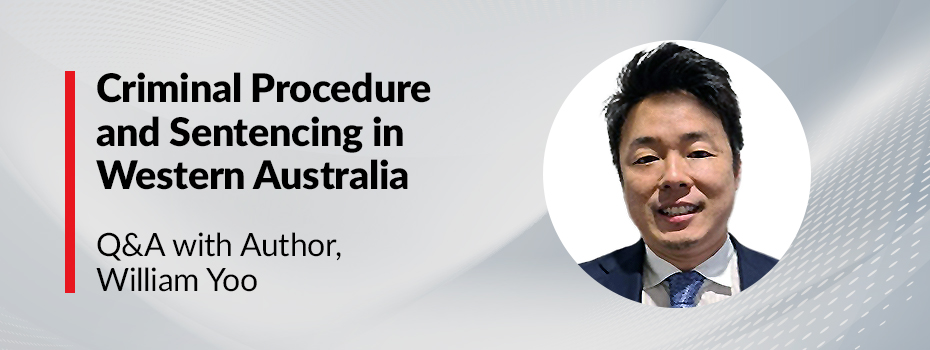
Criminal Procedure and Sentencing in Western Australia Q&A with author, William Yoo
27 October 2022 02:18
Recently, we spoke with William Yoo about his recently released book, Criminal Procedure and Sentencing in Western Australia.
What inspired you to write a book on Criminal Procedure and Sentencing in Western Australia?
Four things. First, my family. They have given me so much. Second, the rights of the poor and disadvantaged. Third, a few things I have read or tried to read in my life. I in no way compare myself to them, but it definitely inspired me to attempt that task. So, St Thomas Aquinas’ Summa Theologiae, Isaac Asimov’s Foundation’s novels, Peter Birks’ writings on Unjust Enrichment and the life works of St Francis of Assisi. The late Justice Ginsburg of the US Supreme Court and her fond regard for Federal criminal procedure was inspiring. Fourth, I wanted to provide access to information, order and taxonomy to this area. I adopted an explanatory approach for students in some areas while in others I had a heavy black letter law approach in others.
How does criminal procedure differ in Western Australia from the other states and territories?
Sentencing and Criminal Procedure is statute based. In sentencing, because it is a difficult task at the best of times, the discretion entrusted to a Court will be tied to the WA Sentencing Act 1995 (WA) and the Young Offenders Act 1994 (WA). In criminal procedure, what Parliament has designated as an Accused person’s rights along with community expectations are again the focus of WA’s Criminal Procedure Act 2004 (WA). There is now a ‘galaxy’ of cases that have and will continue to interpret these three statutes that a visiting practitioner to WA will be best to come to grips with. With a move to a uniform national profession this becomes all the more important.
In your experience, what are the major challenges for a practitioner dealing with cases pertaining to Criminal Procedure and Sentencing?
Laws are complex, nuanced and voluminous in both criminal procedure and sentencing. Attempting to categorise them is difficult. Especially under pressure. I remember being shown a murder trial brief from about 40 years ago when I worked at the ODPP (WA) and it was no more than 20 pages. I also remember being told a trial of 3 days was considered long. Along with the evidence laws and the continuing challenges of criminal liability under the Criminal Code 1913 (WA) (see for example the recent decision of O’Dea v The State of Western Australia [2022] HCA 24) criminal procedure and sentencing now have an equal part to play in the advice that a practitioner and a prosecutor grapple with on a daily basis.
For more information about Discretion in Criminal Justice, contact your relationship manager or visit our eStore.
Latest Articles
-
 3 tips for banking and finance lawyers when responding to an ASIC enquiry, and how to avoid misleading or deceptive conduct.
3 tips for banking and finance lawyers when responding to an ASIC enquiry, and how to avoid misleading or deceptive conduct. -
 Significant increases to competition and consumer law penalties have commenced and sweeping reforms to the unfair contract terms regime will follow in 12 months’ time.
Significant increases to competition and consumer law penalties have commenced and sweeping reforms to the unfair contract terms regime will follow in 12 months’ time. -
 The Australian Securities and Investments Commission (ASIC) is calling on Australian CEOs, from public companies, large proprietary companies and corporate superannuation trustees to review their whistleblower policies and processes to ensure compliance with private sector whistleblower laws.
The Australian Securities and Investments Commission (ASIC) is calling on Australian CEOs, from public companies, large proprietary companies and corporate superannuation trustees to review their whistleblower policies and processes to ensure compliance with private sector whistleblower laws.
Practical Guidance
Your one-stop solution for accurate legal answers from Australian legal experts. Tools, practically focused guidance notes, checklists, precedents, and training materials support and streamline your legal workflow.
LEARN MORE LexisNexis
LexisNexis